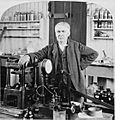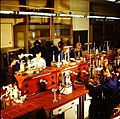Laboratory equipment facts for kids
Laboratory equipment refers to all the cool tools and equipment that scientists use when they work in a laboratory. These special items help them explore the world, from tiny cells to big chemical reactions!
Scientists use lab equipment to do many things, like:
- Performing exciting experiments to test ideas.
- Taking exact measurements of things like temperature, weight, or volume.
- Gathering important data to learn new facts.
Some common examples of laboratory tools include:
- Bunsen burners: These create a hot flame for heating things.
- Burettes: Used to measure and pour very precise amounts of liquid.
- Calorimeters: Help measure heat changes in chemical reactions.
- Microscopes: Make tiny things look much bigger so we can study them.
- Pipettes: Used to transfer small, exact volumes of liquid.
- Spectrophotometers: Measure how much light a substance absorbs.
Contents
Why Do Scientists Need Special Tools?
Scientists need special equipment because their work often requires great accuracy and control. Imagine trying to measure a tiny drop of liquid with a kitchen spoon – it wouldn't be very accurate! Lab tools are designed to be super precise, helping scientists get reliable results.
Different Labs, Different Tools
The type of equipment a scientist uses depends on their field of study.
- In a chemistry lab, you might see lots of beakers, Erlenmeyer flasks, and test tubes for mixing chemicals.
- A biology lab might have microscopes to look at cells and Petri dishes to grow tiny organisms.
- Physics labs often use equipment to study forces, energy, and motion, like lasers or sensors.
Safety First in the Lab
Working in a laboratory means following important safety rules. Many pieces of equipment are designed with safety in mind, or they require special handling. For example, some labs have eyewash stations in case chemicals get into someone's eyes. Scientists often wear lab coats, safety glasses, and gloves to protect themselves.
Images for kids
-
Three beakers, an Erlenmeyer flask, a graduated cylinder and a volumetric flask
-
Chemistry laboratory of the 18th century, of the sort used by Antoine Lavoisier and his contemporaries
-
Thomas Edison in his laboratory, 1901
-
Early 2000s style of counter in Chemical Laboratory, Mahidol University International College, Thailand
-
Laboratory for organic Chemistry at the University of Applied Science Aachen, Campus Jülich, Germany
See also
 In Spanish: Anexo:Equipamiento de laboratorio para niños
In Spanish: Anexo:Equipamiento de laboratorio para niños
 | Chris Smalls |
 | Fred Hampton |
 | Ralph Abernathy |












